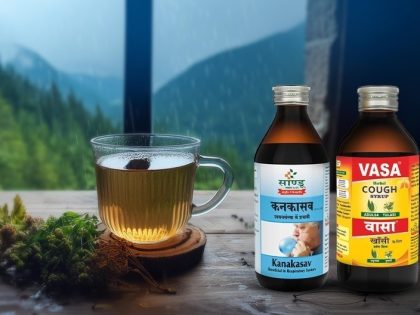Why Herbal Cough Syrups Are a Safer Choice During Seasonal Flu

Why Herbal Cough Syrups Are a Safer Choice During Seasonal Flu
Seasonal changes, especially during monsoon and winter, often bring an unwelcome guest – the common cold and cough. While over the counter (OTC) syrups offer quick relief, many people are turning to Herbal Cough Syrup for a gentler, more holistic alternative rooted in Ayurveda.
Let’s explore why herbal cough syrups are becoming the preferred choice for Indian families, especially during seasonal flu episodes.
What Are Herbal Cough Syrups Made Of?
Unlike chemical-based cough suppressants, herbal syrups are made from natural plant-based ingredients like:
- Tulsi (Holy Basil) – Known for its anti-inflammatory and antiviral properties
- Vasaka (Adulsa) – Supports bronchial wellness and soothes irritation
- Yashtimadhu (Licorice) – Acts as a throat soother and natural demulcent
- Sunthi (Ginger) – Helps relieve congestion and boosts immunity
These ingredients are often combined using time-tested Ayurvedic formulations, making them suitable for both dry and productive coughs.
Why Are Herbal Cough Syrups Considered Safer?
1. No Drowsiness or Addictive Ingredients
Conventional cough syrups often contain antihistamines or codeine derivatives, which can cause drowsiness or dependency. In contrast, herbal cough syrups are free from such compounds, making them safer for regular use, especially in children and the elderly.
2. Mild on the Stomach and System
Many users experience gastric discomfort after using OTC medicines. Herbal formulations are generally gentler on the digestive system, a crucial factor for long-term respiratory wellness.
3. Holistic Healing Beyond Just Suppression
Whereas synthetic syrups mostly suppress symptoms, Ayurvedic herbal cough syrups address the root cause, balancing the Kapha dosha and clearing accumulated mucus or toxins (Ama) from the system.
Can Herbal Syrups Help During Seasonal Flu?
Yes. According to Ayurveda, flu-like symptoms occur when there’s an imbalance in doshas due to seasonal transitions. Herbal ingredients help:
- Strengthen respiratory immunity
- Help reduce inflammation in the upper respiratory tract
- Support the body’s natural detox mechanism
- Helps relieve sore throat, nasal congestion, and cough without side effects
During seasonal flu outbreaks, Ayurvedic herbal cough syrups work synergistically with warm fluids, rest, and light diet to support faster recovery.
Are Herbal Cough Syrups Safe for Children?
Most Ayurvedic cough syrups are safe for children above 2 years, provided the dosage is followed correctly. Always consult a registered Ayurvedic physician or paediatrician before use. Formulations with honey, Tulsi, and ginger are often favoured for kids due to their palatable taste and gentle action.
How to Choose a Trusted Herbal Cough Syrup in India?
When choosing an Ayurvedic syrup, look for:
- Brands with legacy and GMP-certified manufacturing
- Transparent ingredient listing
- Formulations backed by traditional Ayurvedic knowledge
Sandu Pharmaceuticals, offering time-tested formulations to ease cough and cold symptoms naturally.
Expert Ayurvedic Tip
During seasonal flu:
- Take steam with eucalyptus or ajwain
- Drink warm water infused with Tulsi and ginger
- Avoid cold, fried, and dairy-heavy foods
- Support healing with Herbal Cough Syrups and herbal teas
Conclusion
When it comes to managing cold and flu symptoms without harsh chemicals, Herbal Cough Syrups offer a reliable, safe, and holistic alternative. Rooted in Ayurveda and made from powerful plant extracts, they not only help relieve symptoms but also strengthen your respiratory system naturally.
Explore safe and effective herbal cough remedies from Sandu to stay protected this season.
Disclaimer:
The content here is for informational and educational purposes only. It is not intended for medical advice. It does not take the place of medical advice or treatment from a physician. Readers should consult their own doctor or a qualified healthcare professional for specific health concerns and questions.




